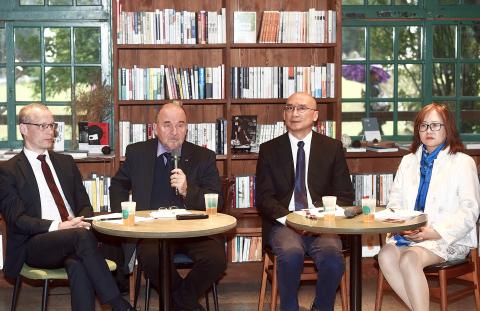Leaders of a German government-funded foundation tasked with assessing the legacy of the German Democratic Republic (GDR) yesterday stressed the importance of dialogue, education and preservation of memories when dealing with a country’s authoritarian past, after the legislature last month passed the Act on Promoting Transitional Justice (促進轉型正義條例).
Federal Foundation for the Study of Communist Dictatorship in East Germany chairman Rainer Eppelmann and foundation deputy director Robert Gruenbaum discussed their country’s experience of handling the Socialist Unity Party of Germany and its illegally obtained assets at a public forum in Taipei at the invitation of the Executive Yuan’s Ill-gotten Party Assets Settlement Committee.
The foundation was established in 1998 by the Bundestag to clarify historical truths and promote human rights education.

Photo: Chien Jung-fong, Taipei Times
Eppelmann, who spent the first 46 years of his life living under East Germany’s authoritarian regime, said it is imperative to legally restore the reputation of political victims, but it is equally important to let them tell their stories and share their experiences.
“The purpose of doing so is to prevent people today and tomorrow from committing the same mistakes and to preserve the memories of what happened in the past,” Eppelmann said.
Dialogue with the perpetrators is a must, as most of them have been living with the fear that others will find out about who they once were and will do to them what they used to do to others.
That is why efforts should be made to let perpetrators know that people are not looking for retaliation, but rather seeking an explanation and a sincere apology, he said.
“People living in the same society must talk to each other and explain themselves. Otherwise, how could we live together?” he said.
At a time when more people than ever are born in democratic societies and take democracy for granted, it is all the more important to teach people about authoritarianism and the values of democracy, Eppelmann said.
Younger Germans do not have any any experience of the country’s auhoritarian past, so the government has attempted to teach them what people’s lives used to be like, Gruenbaum said.
“It is vital to incorporate history about East Germany into college education, because only when college students have a clear understanding of that part of history can they pass the knowledge onto the next generation,” Gruenbaum said.
The forum was overshadowed by members of the Chinese Nationalist Party (KMT) protesting against government efforts to recover the party’s illegitimately gained assets and remove past authoritarian symbols. Eppelmann was asked how such protests should be dealt with.
“Protests are normal, as long as they are not violent,” he said.
Eppelmann from Monday to yesterday led a three-member delegation to Taiwan, which met with officials from the assets committee, the Ministry of the Interior, the Ministry of Culture and the Mainland Affairs Council.
They also visited sites of cultural significance, including Chiang Kai-shek Memorial Hall and the National 228 Memorial Museum.

Taiwanese can file complaints with the Tourism Administration to report travel agencies if their activities caused termination of a person’s citizenship, Mainland Affairs Council Minister Chiu Chui-cheng (邱垂正) said yesterday, after a podcaster highlighted a case in which a person’s citizenship was canceled for receiving a single-use Chinese passport to enter Russia. The council is aware of incidents in which people who signed up through Chinese travel agencies for tours of Russia were told they could obtain Russian visas and fast-track border clearance, Chiu told reporters on the sidelines of an event in Taipei. However, the travel agencies actually applied

Japanese footwear brand Onitsuka Tiger today issued a public apology and said it has suspended an employee amid allegations that the staff member discriminated against a Vietnamese customer at its Taipei 101 store. Posting on the social media platform Threads yesterday, a user said that an employee at the store said that “those shoes are very expensive” when her friend, who is a migrant worker from Vietnam, asked for assistance. The employee then ignored her until she asked again, to which she replied: "We don't have a size 37." The post had amassed nearly 26,000 likes and 916 comments as of this

New measures aimed at making Taiwan more attractive to foreign professionals came into effect this month, the National Development Council said yesterday. Among the changes, international students at Taiwanese universities would be able to work in Taiwan without a work permit in the two years after they graduate, explainer materials provided by the council said. In addition, foreign nationals who graduated from one of the world’s top 200 universities within the past five years can also apply for a two-year open work permit. Previously, those graduates would have needed to apply for a work permit using point-based criteria or have a Taiwanese company

The Shilin District Prosecutors’ Office yesterday indicted two Taiwanese and issued a wanted notice for Pete Liu (劉作虎), founder of Shenzhen-based smartphone manufacturer OnePlus Technology Co (萬普拉斯科技), for allegedly contravening the Act Governing Relations Between the People of the Taiwan Area and the Mainland Area (臺灣地區與大陸地區人民關係條例) by poaching 70 engineers in Taiwan. Liu allegedly traveled to Taiwan at the end of 2014 and met with a Taiwanese man surnamed Lin (林) to discuss establishing a mobile software research and development (R&D) team in Taiwan, prosecutors said. Without approval from the government, Lin, following Liu’s instructions, recruited more than 70 software